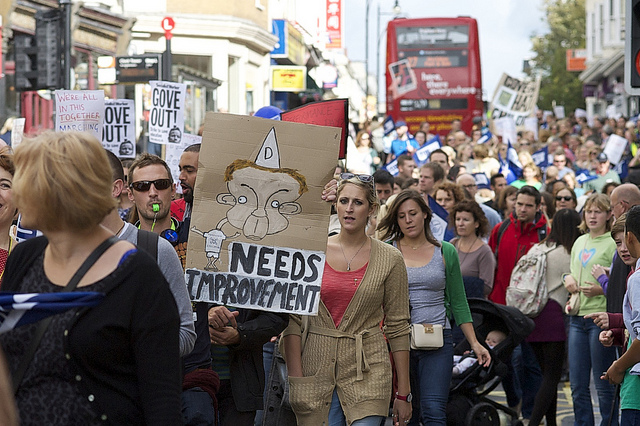British Values? It’s time for schools to give students a future not a catch-phrase
A recent row erupted when the then-Education Secretary Michael Gove responded to the “trojan horse” row about radicalism in state schools by arguing for a tougher approach to instilling “British values”. Responding to the row, Andy Thornton argues that the current emphasis ‘British Values’ can only have meaning if it is supported by better citizenship education in schools.

Michael Gove’s approach to ‘British values’ needs improvement (Credit: Raysto, CC BY NC 2.0)
The term ‘British Values’ has emerged as a catch-phrase to denote Britain’s take on liberal democracy. Beyond face-value, its political appeal is clear. It reaches into the UKIP electoral battleground, hinting that today’s Conservatives remain happy to bundle our history and customs into a formula that conjures up ‘the golden age’.
But its arrival in a fracas over school management has to be something of a surprise. It wouldn’t have been too long ago that British schools and British-ness would have been synonymous. Within living memory schools have been under Local Authority control, so how could they not be exponents of British Values?
You may not know it, but a similar discussion arose in 2007 when Gordon Brown asked for a review of the content of the National Curriculum for Citizenship.
Gordon Brown’s concerns were formulated around ‘British Identity’, not values. But similarly he wanted to ensure that the understanding behind the formation of the UK’s democratic structures was being utilised to create a tolerant and inclusive democracy: enabling established residents and newcomers to work together in peaceful coexistence towards the common good. This was of sound purpose as growing diversity in many regions was provoking conflict, and he could see that state schools (93% of all schools) are a critical cauldron in which values are established and competences for democratic life are developed and tested.
The result was that the citizenship curriculum was expanded to contain a section which essentially instructed all schools to tackle issues of identity, diversity and inclusion within the curriculum.
This bolstered state schools’ duty to introduce students as to the nature of the law, democracy, economy, global ethics, and give them opportunities to practice skills of active citizenship in their school and communities. The subject of citizenship, mandatory for those aged 12 to 16 was building well and nearly 100,000 (1 in 7 students) took a GCSE in the subject in 2010.
I suspect that readers of this blog would be heartened by that.
And similarly disheartened that by 2013 the number had dropped to 42,000 and is likely to continue to fall.
How heart-breaking then that Gove’s recent initiative to force schools to promote British Values is happening whilst the citizenship curriculum is weakening by the minute?
How has that happened? A thirty second guide:
- Michael Gove arrived in government having openly declared his scepticism about the subject of citizenship. It was a newbie, not a classic, and dubious for having been introduced in 2002 by a Labour government even though it was developed by an all-party group in the 90s.
- That scepticism was borne out when his hand-picked curriculum review team suggested it might be dropped in 2011.
- So in the teaching community word got out that schools may soon be able to down-tools on the ‘new’ subject and those who were delivering half-heartedly readily pushed it to one side.
- Then Michael Gove changed his mind. Partly because we campaigned to change it, but possibly because removing any subject from the curriculum would need primary legislation and his style was generally to operate under the radar.
- So instead of removing it as such he fathomed that it could die quietly once enfeebled as a programme of study, damned by a few faint-praises and given DfE radio-silence in relation to its merits…
- It worked. In saying nothing about it to teachers, freeing schools from adherence to the curriculum in academy and free schools (now over 50% of secondaries), removing any inspection of the subject as part of regular Ofsteds, and only speaking of citizenship in glowing terms when asked, he managed to let it lapse whilst appearing to be a fan… on paper.
So back to today and ‘British Values’:
Here Mr Gove caught David Cameron on the hop. Gove coined the term as an encoded reference to established norms that could oppose Islamic social beliefs. It tells of how schools should implicitly pass on the views of liberal democracy in their forms and organising practices, but he didn’t really want it in the curriculum.
Meanwhile David Cameron was door-stepped on what the phrase meant and piped up with British Values should be ‘inculcated into the curriculum’. Unfortunately for Mr Gove his Prime Minster was off-message.
Yet David Cameron’s instinct was probably bang on. How can we use the term ‘British Values’ to describe something that should tame British Muslims but not be passed on to everyone growing up in the UK? Their democratic birth right even. When our children grow up knowing more about computer simulations than real-life how are we ever going to draw them into knowing about the blood, sweat and tears of former generations that bought us the kind of freedoms and prospects that now might be squandered within their life time if global social change presses on at its current pace? They need to be supported to take ownership of that future. Given the capabilities to build it together. But Mr Gove’s blind eye has prevailed.
The prognosis is critical.
From the position of 2002 where schools introduced and slowly developed their workforce to incorporate systematic education to empower the next generation to take up their full potential and responsibilities as active citizens we have now got relative chaos. Falling local democratic control of schools, a drop-off in teaching of the subject and its accompanying skills for participation, a trouble-shooting Ofsted who only consider ‘citizenship’ in order to sweep away aberrations caused by ‘the wrong kind of localism’ and silence from the opposition who don’t seem able to honour David Blunkett’s vision and remind the country that our children so badly need this.
And who are the main losers? Young people.
Young people who until recently have been offered ever-improving support to comprehend their place in the world and become active agents in its future. Young people who need to be introduced to the laws that they are expected to uphold, to the democratic systems that they will need to use to forge a different kind of future in an increasingly diverse country, to the workings of an economy that is complex and fragile in a globalising world, to the obligations of building local communities when families are increasingly estranged from each other in communities of the indifferent. Young people who need skills of negotiation and critical reflection to take part in the modern work place as well as the modern democracy. Young people turned off politics because it is now an incomprehensible circus of copy-book parties unable to keep their promises.
Those young people need democracy decoding and re-presenting to them.
Mr Gove has now gone – and it is time for all parties to regret his silence on education and democratic politics; the bizarre legacy of a master politician, and recommit themselves to our children’s future.
—
Note: This piece represents the views of the author and not those of Democratic Audit or the LSE. It originally appeared on the Constitution Unit blog, and is re-posted with permission. Please read our comments policy before posting.
—
 Andy Thornton is Chief Executive Officer of the Citizenship Foundation.
Andy Thornton is Chief Executive Officer of the Citizenship Foundation.





 Democratic Audit's core funding is provided by the Joseph Rowntree Charitable Trust. Additional funding is provided by the London School of Economics.
Democratic Audit's core funding is provided by the Joseph Rowntree Charitable Trust. Additional funding is provided by the London School of Economics.
British Values? It’s time for schools to give students a future not a catch-phrase https://t.co/JR6DKkHOzS
#BritishValues? It’s time for schools to give students a future not a catch-phrase https://t.co/cnOMXOLXAE https://t.co/1R8LqtmPhf
British Values? It’s time for schools to give students a future not a catch-phrase https://t.co/Jl0v02ftyu